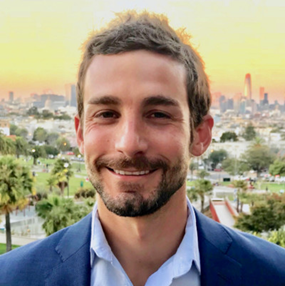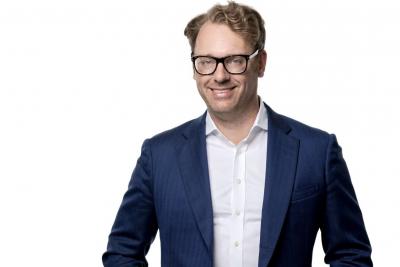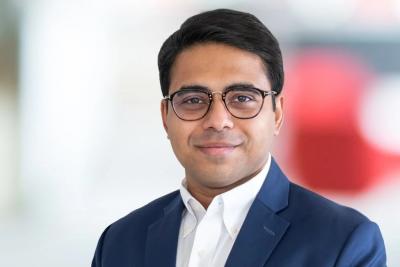Technology Stack & Blockchain Platform Chintai on Transforming the Capital Markets of Today into Tomorrow’s Opportunities

Apr 26, 2022
Chintai is a FinTech company established in 2019 and operating out of its Singapore HQ that utilises blockchain technology to modernise capital markets for banks, financial institutions and asset managers. The firm’s institutional-grade digital asset platform removes inefficiencies throughout the lifecycle of traditional financial assets, such as shares, real estate, bonds, debt and more. The strategic mission is to bridge the world of traditional finance with a blockchain technology platform and build a new competitive advantage with clients. Born and raised in Sacramento, California, Chintai co-founder Ryan Bethem is an avid surfer, and for the past several years he has been riding the surging digital assets and blockchain waves towards a brave new world of financial markets disintermediation. Still based out of California but looking forward to more trips to Singapore and Asia. Hubbis ‘met’ with him recently to hear how this holder of a master’s degree in psychology and one-time practising psychotherapist in California, the global epicentre of therapy, is helping to build what he and co-founders David Packham and Philip Hamnett imagine to be the financial infrastructure of the future. Armed with USD7.5 million in funding raised in the middle of 2021, Ryan reports the firm’s sights are locked and loaded for rapid growth ahead.
Ryan has come a long way in a relatively short time since he built and managed clinical psychotherapy treatment centres and businesses in the US in 2014. After a career transition in 2018, he is now co-founder of Chintai, a well-funded digital asset service provider that's aiming to disrupt capital markets globally by providing a truly comprehensive suite of products. These products enable anybody - from the largest financial institutions right down to entrepreneurs - to carry out different forms of dynamic issuance, launching of liquid secondary markets, all within an overarching compliance control framework that enables them to operate those types of assets in any jurisdiction.
Singapore-based Chintai’s blockchain solution includes dynamic Issuance, automated compliance, reporting, data reconciliation, cap table management, automated corporate actions, instant settlement and more.
Chintai’s end-to-end platform
The end-to-end solution offers traditional finance companies a one-stop platform with a robust automated compliance engine powered by a proprietary artificial intelligent solution called Sentinel-AI. This platform also caters to boutique sized EAMs, or family offices by providing a competitive edge to intensify their growth with blockchain technology.
The Chintai blockchain solution is built for the expanding universe of compliant digital assets. Key components of capital markets infrastructure are integrated to maximise efficiency throughout the trade life cycle of digital assets and offer ease of use for businesses.
Institutional grade with white label optionality
The platform includes dynamic digital asset issuance, secondary market trading, and a compliance framework that enables regulatory controls to be customised on the basis of jurisdiction and a given asset class. Chintai blockchain solutions are designed to be institutional grade, offering a user experience similar to traditional centralised applications.
The firm also offers a white-label option allowing greater autonomy for clients to issue, manage and control the tokenisation process with blockchain technology solutions.
The on-chain audit trail built in provides uncompromised traceability powered by AI. For anomalies, the platform will activate human intervention to maintain the integrity of its AML/CFT compliance protocol.
Lean finance
“What this all means,” Ryan explains, “is that the Chintai blockchain network removes prohibitively expensive and unnecessary administrative overhead in capital markets, most of which is performed by highly paid people that in the world of blockchain facilitation are not necessary. By doing this we create an opportunity for small-mid size enterprise and asset managers to create new business lines and access investment capital. As our clients can white label our compliant technology, they can very easily become their own issuer.”
Examples include real estate, which can be fractionalised and syndicated to a wider audience of investors, or carbon credit markets with high integrity to help mitigate climate change, or possibly crowdfunding and investment capital, as well as bonds and credit.
From carbon black to green shoots
He adds some more detail, explaining that, for example, they are working with a company called JustCarbon and others that are creating carbon markets. “Existing carbon markets are opaque and lack integrity. Brokers also charge fees up to 35%.”
“Using our technology carbon credits and secondary markets can easily be created with transparency, legitimacy and an immutable audit trail. As a result corruption in the markets is solved and the broker is removed from the equation entirely. This favours not only the value creators, but also ensures carbon offsets are legitimate, which helps us move towards a carbon neutral future.“
“We are also working with several companies innovating in the ESG space and looking to bring investment capital to a rapidly expanding industry. One of which is named GreeniumX, which provides crowdfunding for green tech companies.”
Building the firm, creating the culture
Ryan explains that his role as co-founder spans several areas of the company functions, including administrative operations, talent management, financial management, business strategy, sales and instilling a holistic company culture.
He expands on this last point, explained. “Having a background in psychotherapy gave me the opportunity to deeply understand that providing humans the right environmental conditions to thrive is in many cases all that’s necessary for psychological health and success in life. I translated into Chintai by instilling a bottom up approach to company culture. This means we place great emphasis on providing a path for every individual to gain lasting personal fulfilment out of their work and the relationships they develop at Chintai. No one is punching in and out. People are self motivated and make impactful contributions when they feel supported this way. And when your company is a collection of people driven by personal fulfilment, it snowballs and reverberates through everything we do.” Chintai’s democratisation missions
The corporate mission, he reports, centres on driving democratised access to financial opportunities. “We see that the existing financial system has a tendency to monopolise power, and the by-product is seen in the capital markets as subdued competition and untapped innovation,” he reports. “We see ourselves as the key that unlocks innovative potential and encourages competition, so that the focus is less on instilling power and increasing margins, and more on the market participants, investors and their communities.
We question whether this means that Chintai is more driven by mission than bottom line. Ryan dismisses that idea, stating that a purpose-driven company has a higher chance of succeeding, and of fulfilling a business vision that also aligns with people and future needs.
The body corporate and the vision aligned
“Ours is a vision of the future, and our ideals are embedded in the heart of the founding team,” he says. “But this is not abstract, we are highly focused on our clients, employing an agile framework throughout the company to make sure their feedback is translated into the fabric of how we iterate on our product and business strategy.”
He adds that Chintai team members are also completely involved in the bigger purpose, right from the hiring and onboarding process, and reinforced constantly through weekly meetings in which everyone has exposure to the inspiration and purpose of the company.
Community matters
Ryan expands further on the firm’s culture, which he says is vital to its mission and creativity. “The corporate culture is the foundation of our success,” he says. “Companies have the power to greatly influence their communities and that in turns spreads out globally.”
He says they believe the essence of a business is people coming together to work on solving a problem and the interpersonal relationships built in the process help achieve those goals.
“Broken or toxic links within the system will weaken the entire chain,” he cautions. “Too many people have worked in demoralising or dispiriting companies and conditions, so we are aiming to raise our standards way beyond that sort of quagmire.”
Raising the game
That, he elucidates, is why one needs transparent principles that evolve over time and a strong cultural immune system. “We believe in team-wide participation in the development of our principles and active participation in safeguarding our culture,” he says. “We believe in individual fulfilment as a means to long term company success. It is a simple equation.”
These are words and all fine and good, but Ryan also knows that the reality of practising this requires constant attention to detail. “I am one of the founders, and this is one of my core missions,” he reports. “We are dedicated to maintaining regular communication, with virtual meetings and regular team-wide discussions on various aspects of the company progress, challenges, and solutions. We also hold team meetings every six months to discuss the team culture and reinforce our principles. We try to be honest about what has worked and what hasn’t worked. We then use that to refine our principles.”
Collective responsibility
He adds that his reference to the firm’s ‘cultural immune system’ precisely encapsulates this. “We have individual and collective responsibility for maintaining our culture in every action we take and being vocal with our peers when they take actions that go against our principles,” he says. “In this way, we steer this ship on the right passage.”
Talent and culture co-mingled
Singapore is a melting pot of races, religions and nationalities, and Chintai is benefitting from this diversity.
“Different perspectives translate to multidimensional understanding and optimised decision making,” he says. “We hire based on talent, and on the adoption of our corporate vision and culture. The diversity we have achieved now sees us with team members from over 10 countries, including Singapore, Malaysia, Pakistan, India, Germany, the UK, Sweden, Russia, Croatia, Columbia, the United States, and Zimbabwe.”
Holding on to the best and the brightest
Ryan also acknowledges that people can often shift jobs rapidly, especially in the new technology space. Retaining talent is therefore vital.
“Our emphasis is on the growth of our employees,” he explains. “We try to empower people to engage in their work in a way that brings personal meaning and deep satisfaction. We spend so much time of our lives at work, and we believe the quest to democratise finance with new technology and solutions is truly engaging and a valuable mission. People relate to that and buy into our collective imagination.”
Moreover, he explains that any new hire meets pretty much everyone before they sign on. “We see people from all angles, and they see us from all our perspectives,” he says. “We then keep closely engaged throughout their careers with us. Ultimately, we want people to feel deeply connected to their work and the meaning it brings to their lives.”
Spreading the word
He explains this culture also extends to Chintai’s clients and partners. “We always want to work with like-minded partners,” he says. “This means sharing in success, good communication, respect, honesty, accountability and looking out for mutual needs. Our team is very motivated and eager to work with partners who share similar values and will work together to improve ourselves through our partner relationships.”
Ryan reports that for the company’s evolution, articulating these values and adopting these practices had moved the business from a perhaps excessive focus on the technology at the outset to a far more comprehensive approach to communication with their clients.
Refining the model, elevating the proposition
He explains that the firm shifted from its early focus on a particular technological protocol and early product successes to a far greater focus on the capital market space, where they quickly realised would turn the company to profitability and also fulfil its broader mission of democratising access.
“Our clients are usually awed by the product suite since it makes blockchain technology easy to use. They do not need to fully understand it in all its intricacies,” he says. “But they do need to completely appreciate what it can do for them, and then we are in positive forward motion with them. We now have a far firmer sense of our clients’ challenges, how to address them, and we have greatly simplified and accelerated the onboarding, so they are up and running, using our technology as rapidly as possible. In short, we have reacted rapidly to a greater understanding of the pain points and the needs of the clients to offer better solutions and better outcomes.”
Refinement through “fail fast and learn fast”
As to specific demand for Chintai’s solutions and the future ahead, Ryan explains that there is a lot of interest from mid to smaller sized companies.
“Earlier on, we cast our net too wide and tried to achieve too much, but now we understand the clients better, we can tailor our products fit and the compliant rollout of those products and solutions to the real market we discern,” he reports.
Key Priorities
Ryan quips that his three main priorities are sales, sales and more sales. “We obtained the USD7.5 million in funding in the middle of 2021. That has helped us put the building blocks all in place for success and we're now armed and ready to launch the product to market. For any young company in an emerging technology product market fit and sales is essential, but particularly in a global economy that is contracting. Our goal is to be default positive by the end of 2023 and given our traction thus far this is achievable. With this in mind we are moving fast to build our customer and investor base.”
Another priority is to solve the riddle around the legal structuring required for clients wanting to onboard their platform, which is often prohibitively expensive for some smaller operators. “We are exploring other types of avenues that are okay with the regulator that might be less expensive upfront,” he explains.
The third priority is to raise more funding. We have ample runway, but having proved product market fit and built a team that is ready for expansion, w e are debating the idea of doing a bridge- round versus a Series A because of the macro-economic conditions,” he reports. The economic conditions for venture capital have changed dramatically since last year, even perhaps since a few months ago. Companies were raising 100x ARR and that has reduced to around 20-40x. The bridge round would involve a smaller round of funding involving strategic investors to help us to scale our business and capture market share.”
A further mission is to build out more talent, but therein lies a challenge. “We can find the right people, the right talent, but as I explained our culture and philosophy must not be diluted, so we are working out how we maintain and build on that when we go from 22 people today to perhaps 40 or 50 in the near term.”
Ryan closes the conversation by reiterating the need to drive sales. “We are acutely aware of the macroeconomic conditions, and think things might get more challenging before it gets better, so companies that are generating the revenues will be at the front of the queue for funding,” he says. “We will be in that position, able to capitalise on any downturns and ready to take advantage of the possible upturns. In short, we will be ready.”
And his very final comment is that he has been humbled and energised by the challenge of launching a start-up such as Chintai.
“You do not necessarily need formal business training, but you definitely need motivation, commitment, forbearance, a vision and the drive to succeed,” he says. “Businesses are also ultimately run by people and human relationships and networks. I think there's also a lot of value there for somebody like me who comes from a psychology background. This has been scary, intimidating, but also well worth the risks and so far, incredibly fulfilling. We are looking forward to writing the next few chapters ahead.”
Singapore – the ideal global hub
Ryan’s final comment is that Singapore was chosen as the centre for the operations, due to its evident commitment to digitisation and the forward-thinking regulator.
“We see great continuity here as well,” he reports, “and certainly more so than, for example, in the US, where administrations change, and policies can sometimes alter significantly. “Singapore is home for Chintai now and is a great springboard from which to build out in Asia and well beyond.”
Getting Personal
Inspired by the disruptive power of blockchain technology in the global financial system, Ryan co-founded Chintai in 2019 to promote financial inclusion.
Prior to helping start Chintai, Ryan achieved a Bachelor’s Degree in Psychology from the University of Oregon and then a Masters in Psychology from a graduate school in San Francisco named the California Institute of Integral Studies. He then became a certified and licensed Psychotherapist in California in 2014, managing clinical programmes for inpatient dual diagnosis treatment in a residential setting and built clinical outpatient treatment practice.
He recalls his work in psychotherapy with great fondness, explaining that he learned so much about people and himself during those times. “I loved those times, and found it all incredibly fulfilling, but in 2018 Chintai became my new calling, and we set about it with my business partners David and Philip and, well, here we are today expanding and moving forward and having raised a serious round of funding in 2021,” he reports.
Ryan is still based in California, where he and his partner have recently enjoyed the arrival of their first-born, a son who is now approaching two months old. “Times have changed, and will change again, but it is a joy thus far,” he says. “I am looking forward to spending more time in Singapore and Asia in the future, but right now it is great to be here, and I am helping to drive the firm forward as one of the co-founders from here.”
When he is not working, he spends his time at sea surfing, not unusual for a California native who grew up in Sacramento. “Surfing is more than surfing to me,” he explains. “Honestly, it is akin to a spiritual experience. I seem to meditate out there, connecting to something far more powerful than me or any of us. I also love backpacking too and getting out in the countryside here in California. I live just outside of San Francisco which makes it easy to get quite remote and fully disconnected from the fast-paced world of building a blockchain company. ”
Find out more about Ryan Bethem and Chintai through other Hubbis collaborations:
https://hubbis.com/video/helping-asian-wealth-and-asset-managers-embrace-digital-assets

Founder & COO at Chintai

More from Ryan Bethem, Chintai
Latest Articles






